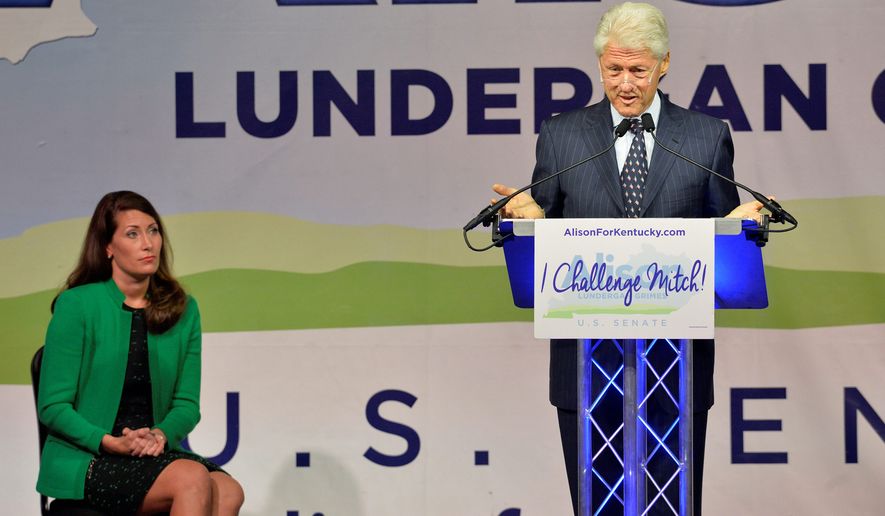On the campaign trail, President Obama’s status as the Democratic Party’s No. 1 rock star has been supplanted by a power couple kicking off their political comeback tour.
While Mr. Obama has been a rare visitor on the stump over the past few weeks, Bill and Hillary Rodham Clinton are in demand, parachuting into battleground states and rallying support for Democrats in key races.
Last week alone saw Mrs. Clinton campaign for candidates in Minnesota, North Carolina and elsewhere, while the 42nd president is lending a hand to Democrats in tight contests in Kentucky, Louisiana, Arkansas and Wisconsin, to name just a few.
By contrast, Mr. Obama has done just two campaign events thus far — rallies for Maryland gubernatorial hopeful Anthony Brown and Illinois Gov. Pat Quinn. A planned campaign stop for Connecticut Gov. Dannel Malloy was scrapped last week amid the Ebola crisis.
The White House said Wednesday that the president will head to Wisconsin Tuesday to stump for Mary Burke, the Democrat challenging incumbent Republican Gov. Scott Walker, and trips to relatively friendly political ground in Maine, Michigan and Pennsylvania in the campaign’s final days are also possible.
Political analysts say the president’s status as something of a pariah in the year’s hottest contests comes from a combination of factors, including low approval numbers and the fact that many tight races are being fought in Republican-leaning states where Mr. Obama is even more unpopular.
On the other hand, Mrs. Clinton is seen as the party’s future, as she is miles ahead of all potential Democratic rivals in the party’s primary process. She has yet to officially declare whether she will run in 2016.
Her husband remains his party’s top weapon on the trail, with approval ratings in the mid-60 percent range, recent polls show, and his record in the 1990s leads many voters to hark back to a time of economic prosperity.
“He’s somebody who has a higher likability factor than Obama ever had. He’s more personable, and he’s an elder statesman figure now rather than just a partisan figure,” said Bruce Buchanan, a political science professor at the University of Texas at Austin who specializes in presidential politics. “He’s the most articulate, well-informed debater and presenter of the argument for the Democrats. There is nobody better.”
For his part, the current president seems to understand that he’s more of a liability than an asset for many Democrats. A Gallup poll released this week shows his approval rating at just 41 percent, nearly the lowest of his presidency.
“This isn’t about my feelings being hurt,” he said on Al Sharpton’s radio show earlier this week when asked about Democrats keeping their distance. “These are folks who are strong allies and supporters of me, and I tell them, ’You know what, you do what you need to do to win. I will be responsible for making sure that our voters turn out.’”
While he’s been missing from the campaign trail, Mr. Obama has on several occasions said that his policies are on the ballot this fall. That’s led to a few uncomfortable moments for Democrats in close races as they try to walk a tightrope between supporting the president but not being too closely tied to him.
SEE ALSO: Chris Christie, Hillary Clinton most talked about 2016 contenders: Study
In Kentucky, Democratic senatorial candidate Alison Lundergan Grimes, who is running against Senate Minority Leader Mitch McConnell, has repeatedly refused to say whether she voted for Mr. Obama.
In New Hampshire, Sen. Jeanne Shaheen, a Democrat, drew laughter from a debate audience this week by not answering a simple “yes” or “no” question on whether she approves of the job Mr. Obama is doing.
“In some ways I approve, and some things I don’t approve. Like most questions that we deal with as policymakers, there aren’t simple answers,” she said.
Ms. Shaheen faces a challenge from Republican Scott Brown.
The president’s political problems certainly aren’t new, but they seem to be amplified beyond even what his predecessor, George W. Bush, faced at a similar point in his second term.
Weeks before the 2006 midterm elections, Mr. Bush’s approval ratings hovered in the mid-to-upper 30s, even lower than Mr. Obama’s current figures, according to Gallup surveys.
Yet Mr. Bush — while certainly not in high demand to appear on the campaign trail — still stumped for Republicans in tight races in Georgia, Texas and Iowa.
Mr. Obama has made no such appearances for Democratic congressional candidates.
Even first lady Michelle Obama is much more popular than her husband on the trail. Just this week she’s campaigned for Democratic senatorial hopeful Bruce Braley in Iowa and Sen. Al Franken, Minnesota Democrat.
Mr. Braley faces Republican Joni Ernst, while Mr. Franken is trying to fend off Republican Mike McFadden.
“Michelle is doing a lot in some of these states, these battleground states. She’s a lot more popular than her husband in terms of reaching out to African-Americans and women. I think she is arguably in a position to do Democrats more good than [President] Obama,” said David Yepsen, director of the Paul Simon Public Policy Institute at Southern Illinois University and a longtime political writer, editor and columnist at The Des Moines Register.
• Ben Wolfgang can be reached at bwolfgang@washingtontimes.com.




Please read our comment policy before commenting.